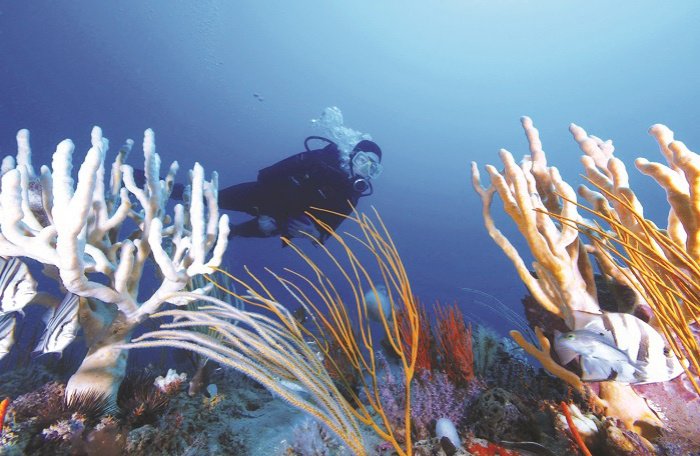Diving: Enforcing professional diving ethics

PHUKET: Almost every diver remembers his or her first dive instructor, as well as probably every
instructor or dive master trained under since.
Learning underwater skills is a bonding process; it requires a great deal of trust – but what about trusting the dive professional’s environmental-impact philosophy?
There is no doubt that diving puts stress on the marine environment through our presence, as well as the choices divers make on how they directly or indirectly interact with the marine world.
So where do divers draw the line when it comes to stressing the environment and the magnificent animals that live in it?
Is snapping your fingers at a Christmas tree worm to watch the brightly colored ‘gills’ snap up and disappear okay?
What about chasing a giant manta ray, riding a turtle or shining your torch on a sleeping parrot fish?
Spend five minutes on the internet and it becomes clear that there are a lot of people who draw different lines in the proverbial sand when it comes to ethically interacting with marine animals.
“There are no rules and very few laws, just interpretations of what is good and bad for the environment. Is touching a manta ray acceptable? Your first response would be no, but what if you are touching a manta ray to remove a net, line or hook so that it may survive longer?” PADI Course
Director Kevin Black of KiwiDiver.com asks.
“An instructor is meant to be a role model, a marine ambassador, particularly since they make their living from the marine environment. Therefore, it goes without saying that the example the instructor sets for their customers impacts public perception of the importance of the marine environment. If an instructor or dive guide swims along picking up rubbish then a customer will normally follow the example, just as a guide swimming past rubbish sets a bad example.”
All dive professionals are supposedly instilled with an understanding of environmental ethics via their training.
“Environmental ethics are ingrained in PADI’s philosophy and professed throughout PADI’s training materials and Project Aware’s mission,” says Andy Auer, PADI Thailand West Coast regional manager.
“PADI members are required by PADI standards to follow a professional code of practice toward the environment.”
Nonetheless, social media groups, such as ‘Phuket Scuba Industry Name & Shame’, use Facebook to regularly broadcast video footage and photographic proof that dive professionals are willing to bend or even break the rules.
“Bending the rules to show students specific things or provide the customer experience the diver wants is definitely the most often cited reason instructors and dive masters give for their abusive and destructive behavior,” dive instructor and marine conservationist Joe Blasy, who used to be based in Phuket, says.
“In a tip driven profession, dive professionals convince themselves that, as such, they are somehow exempt from demonstrating proper behavior when in reality it’s actually much more important they set the proper example. These professionals underestimate the influence their behavior has on their students and other divers.”
However, there is a temptation to immediately address such issues.
“Creating photographic evidence, videos and written witness reports of the offending situation is best,” explains Mr Black. “Then send this to the dive center and their associated training agency or regional manager. Most legitimate dive centers would take this seriously and investigate the matter, council the instructor or dismiss them. This can be harder for centers that have a constant turnover of independent freelance contractors who just move from one company to another.”
Mr Blasy concurs, but cautioned anyone from getting directly involved underwater.
“This has led to some dangerous situations after the offending diver became aggressive. Video and photo evidence can be helpful, but consider you and your customer’s safety first.
“Individuals will first want to contact the management or owners of the company the offending diver represents. I have had a lot of success with the ‘I know your company cares deeply about the marine environment, so I am sure you will want to know…’ approach. They have always been receptive.”
Of course, if the dive professional continues with unethical practices underwater, the next step is to contact the certification agency to which the dive boat or shop associated with the professional belongs.
Every certification agency has a policy prohibiting abusive or destructive behavior, and all members are obligated to abide by it or risk being expelled.
For example, the two largest certification agencies, SSI and PADI, both have quality assurance departments which actively investigate members, explains Mr Blasy. They can be reached by sending an email to thailand@divessi.com or qa@padi.com respectively.
“More serious violations of marine protection laws should be reported to authorities, which in Phuket would be the Department of Coastal Resources. The Endangered Species Unit at the Phuket Marine Biological Center investigates violations of marine protection laws. They can be reached by emailing pmbc@dmcr.mail.go.th or calling 076-391128,” says Mr Blasy.
This article first appeared in the August 1-7 issue of the hard-copy Phuket Gazette newspaper.
Digital subscribers may download the full newspaper, this week and every week, by clicking here.
Keep checking the Phuket Gazette, join our Facebook fan page or follow us on Twitter
@PhuketGazette for the latest news updates.
— Isaac Stone Simonelli
Latest Thailand News
Follow The Thaiger on Google News:


























